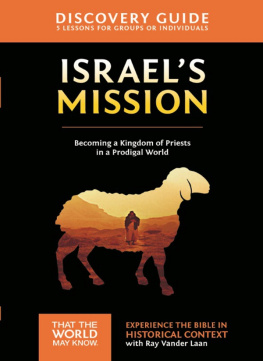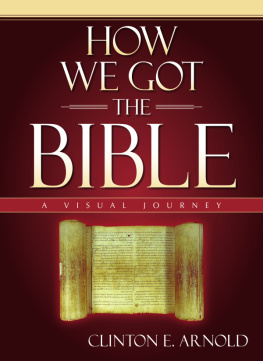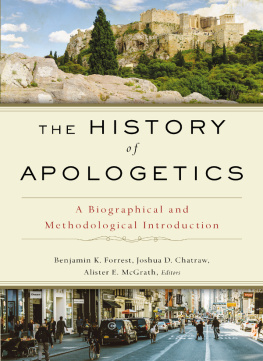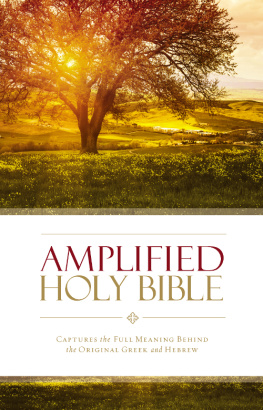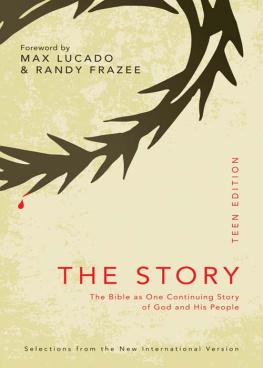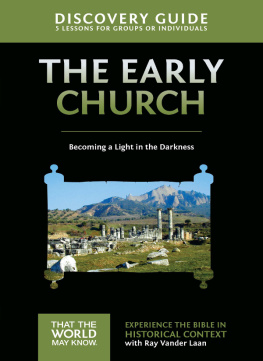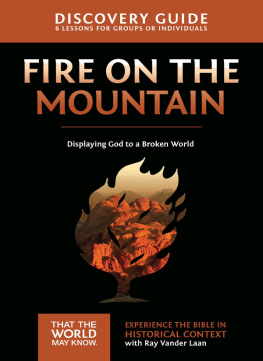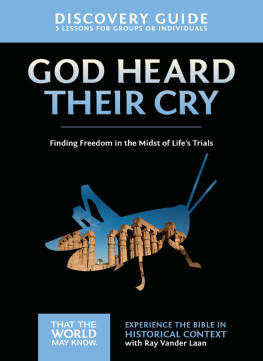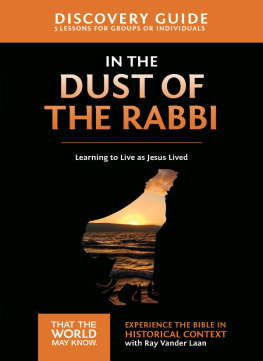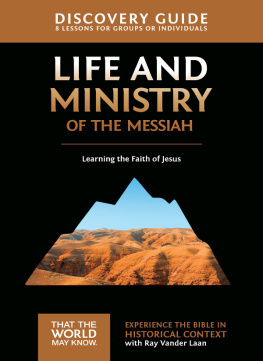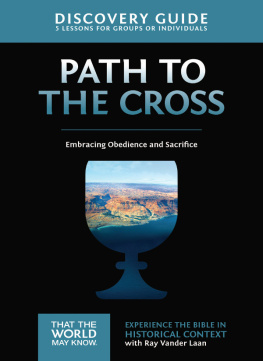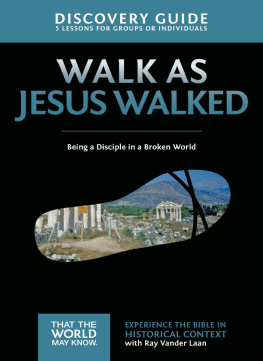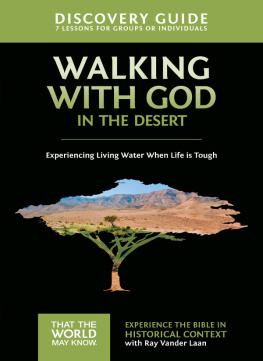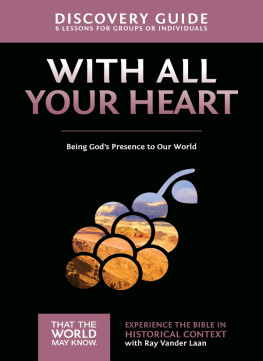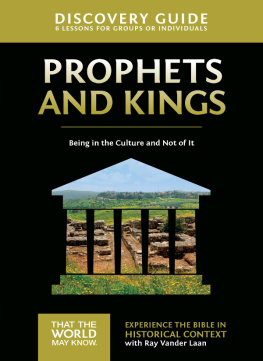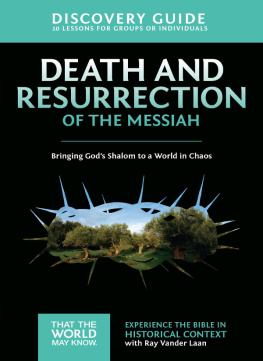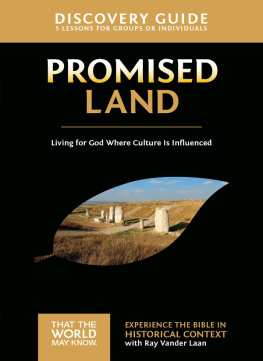That the World May Know with Ray Vander Laan
Volume 1: Promised Land
Volume 2: Prophets and Kings
Volume 3: Life and Ministry of the Messiah
Volume 4: Death and Resurrection of the Messiah
Volume 5: Early Church
Volume 6: In the Dust of the Rabbi
Volume 7: Walk as Jesus Walked
Volume 8: God Heard Their Cry
Volume 9: Fire on the Mountain
Volume 10: With All Your Heart
Volume 11: The Path to the Cross
Volume 12: Walking with God in the Desert
Volume 13: Israels Mission
ZONDERVAN
Israels Mission Discovery Guide
Copyright 2015 by Ray Vander Laan
All rights reserved under International and Pan-American Copyright Conventions. By payment of the required fees, you have been granted the non-exclusive, non-transferable right to access and read the text of this e-book on-screen. No part of this text may be reproduced, transmitted, downloaded, decompiled, reverse engineered, or stored in or introduced into any information storage and retrieval system, in any form or by any means, whether electronic or mechanical, now known or hereinafter invented, without the express written permission of Zondervan.
ePub Edition June 2015: ISBN 978-0-310-81198-5
Requests for information should be addressed to:
Zondervan, 3900 Sparks Dr. SE, Grand Rapids, Michigan 49546
All maps created by International Mapping.
All photos are courtesy of Ray Vander Laan, Paul Murphy, and Grooters Productions.
All Scripture quotations, unless otherwise indicated, are taken from The Holy Bible, New International Version, NIV. Copyright 1973, 1978, 1984, 2011 by Biblica, Inc. Used by permission. All rights reserved worldwide.
Scripture quotations marked ESV are taken from The Holy Bible, English Standard Version, copyright 2001 by Crossway Bibles, a division of Good News Publishers. Used by permission. All rights reserved.
Scripture quotations marked KVJ are taken from the King James Version of the Bible.
Any Internet addresses (websites, blogs, etc.) and telephone numbers in this book are offered as a resource. They are not intended in any way to be or imply an endorsement by Zondervan, nor does Zondervan vouch for the content of these sites and numbers for the life of this book.
All rights reserved. No part of this publication may be reproduced, stored in a retrieval system, or transmitted in any form or by any means electronic, mechanical, photocopy, recording, or any other except for brief quotations in printed reviews, without the prior permission of the publisher.
Cover design: DoMoreGood
Cover photography: Grooters Productions
Interior design: Ben Fetterley, Denise Froehlich
First printing April 2015
CONTENTS
Ebook Instructions
In this ebook edition, please use your devices note-taking function to record yourthoughts wherever you see the bracketed instructions [Your Notes] or [Your Response].Use your devices highlighting function to record your response whenever you areasked to checkmark, circle, underline, or otherwise indicate your answer(s).
The Bible makes it clear that the one true God desires to be known by all people.
The Hebrew word for know, yadah, means more than rational awareness of facts. Itimplies intimate personal experience. For example, a literal translation of Genesis4:1 says, Now Adam knew [yadah] Eve his wife, and she conceived and bore Cain (ESV).Thus knowing God is not only knowing about him theologically but also experiencinga relationship with him. As people experience him, they will acknowledge him as theone true God and give him the praise he alone deserves.
The Lord makes himself known by what he says and does. As he acts in history, peopleexperience him, come to yadah him, and develop a relationship with him. The deliveranceof his people from slavery in Egypt, for example, reveals Gods intention that theHebrews, the Egyptians, and even Pharaoh would know him as they experienced his powerand greatness. This thread runs through all of Scripture: The creation must knowits Creator; the nations, their King; and all people, their Savior.
In the opening chapters of the Bible, God entrusted Adam and Eve with a mission tofill the earth, use it wisely, and rule it well. that would make him known so that all people would experiencehim. Although it is Gods redeeming grace that restores alienated people to God,he entrusted to his people the mission of making himself known.
The central message of the gospel is that God sent his Son, Jesus, to redeem peoplewho were alienated from him because of their sin. Jesus atoning death and resurrectionare the source of eternal life and the only way to be restored to relationship withthe Creator. But we must not overlook the way Jesus also carried out the missionof making God known so that all people could be restored to relationship with hisFather. Just as God called Israel to be the light of the world and to make Godsname known, Jesus did the same. By his words and actions Jesus revealed Gods nature,making it possible for people to know him.
The mission of making God known to all people was not completed during Jesus ministryon earth. Jesus entrusted it to his disciples during his last teaching before ascendingto heaven. Matthew records his words, sometimes called the Great Commission, mostsuccinctly:
Then Jesus came to them and said, All authority in heaven and on earth has beengiven to me. Therefore go and make disciples of all nations, baptizing them in thename of the Father and of the Son and of the Holy Spirit, and teaching them to obeyeverything I have commanded you. And surely I am with you always, to the very endof the age.
Matthew 28:18 20
By this commission, Jesus disciples became the light of the world, people who wouldlive in such a way as to hallow Gods name make his character and reputation knownto the nations.
Christians have always believed that this mission is the task of the community ofGods people. To be a follower of Jesus is to become part of a journey that spansmillennia as it moves toward its final destination the restoration of all things!It is to participate in the greatest undertaking ever known. It is to join Abraham,Sarah, Moses, Ruth, David, Elijah, Isaiah, Mary, Peter, and Paul in partnershipwith the Creator of the universe as his instruments, bearing the good news of redemptionto all people. That is the clear meaning of Jesus words.
Sometimes, however, Christians have limited this mission to evangelism or sharingthe message that Gods only Son has come and offers salvation in his name. Certainlythat gospel, or good news, is at the heart of the mission God has given us. Butthe mission God has entrusted to his people does not originate from Matthew 28 alone;it comes from the entire Bible. The mission God has given to his people is the threadthat ties all of Scripture together from the beginning of time until all things arecompleted.
The mission continues in Gods people today. Although the increasingly secular stateof Western culture is sobering, leading some Christians to voice resignation to theinevitable decline of a broken world, Gods desire for all people to know him hasnot diminished. Never has there been a greater opportunity to serve as Gods coworkers,his kingdom of priests, who mediate his presence and make him known. We must notonly declare the good news of his saving work but also live as concrete examplesof knowing God by displaying his character through our actions.
The Text in Its Context
Throughout human history, God has spoken and acted in the context of the culturesin which his people lived. Abraham cut up animals to seal a blood covenant muchas the Hittites did. The design of the temple of the Lord built by Solomon in Jerusalemwas familiar to the neighboring cultures of Gods people. In Corinth where clay andmarble body parts were displayed as votive offerings to the pagan god of healing,Paul describes the community of faith as a body made up of many parts. God had aunique purpose for communicating his message through these culturally familiar conceptsand practices that made the point of his message strikingly clear and relevant.Thus the cultural setting in which God placed his revelation is useful for understandingthe message and application of Scripture, much like the study of the language ofthe ancient culture provides for the interpreter.
Next page
